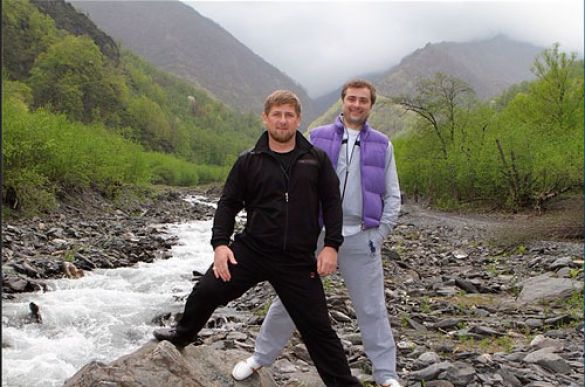
Did Surkov Step Down, or Was He Forced to Step Down?
Publication: Eurasia Daily Monitor Volume: 10 Issue: 98
By:

In his childhood, Vladislav Surkov, an ethnic Chechen by birth, initially had his father’s surname, Dudaev—a surname that is related to the Zandak teip (clan) (www.anticompromat.org/surkov/surkbio.html). However, with Russian first and last names, he managed to achieve not simply a breathtaking career, but to become the main ideologue of the policies pursued by President Vladimir Putin.
Surkov was able to become the “gray eminence” in the Kremlin after dethroning Boris Berezovsky and destroying Vladimir Gusinsky’s media monopoly in Russia (Segodnya newspaper, March 30, 2000). Mikhail Khodorkovsky and Platon Lebedev, who challenged Putin’s policies, fell from grace later (https://inosmi.ru/inrussia/20050620/220396.html). As the creator of the new United Russia party, Surkov could handpick candidates across the whole country for the purpose of providing support for Putin (https://www.rb.ru/inform/63947.html). Surkov was also the “father” of the notorious youth organization Nashi, which provoked massive criticism in Russian society. Observers also attribute to Surkov the establishment of a range of nominal opposition parties in Russia designed to create the illusion of political competition and democratic choice for the population.
Regarding the North Caucasus, Surkov was the informal supervisor of the Kremlin’s policies in this controversial sector of Russian politics. His activities as supervisor of the Kremlin’s policies toward the North Caucasus should be subdivided into two periods. The first was during the first presidency of Vladimir Putin in 2000–2008 (https://putin.kremlin.ru/bio) and the second during the presidency of Dmitry Medvedev in 2008–2012.
During the first period, no one was supposed to know that Surkov was responsible for the Kremlin’s policy toward the North Caucasus and, specifically, toward Chechnya. The reason for the secrecy was that the government wanted to create the illusion that the situation in Chechnya was developing according to its own internal logic and was not directed by the Kremlin. At that time, few people in Russia realized that Surkov was an ethnic Chechen. Any hints of his ethnicity were perceived as jokes made by his enemies.
Surkov’s anonymity changed dramatically in the second period of his policymaking preeminence, when he started to overemphasize his Chechen background. He made frequent visits to Chechnya, including for vacations, and had numerous meetings and tours of ambitious construction sites in Chechen President Ramzan Kadyrov’s company. This probably showed that Surkov became much more confident of his position and no longer considered it necessary to conceal his ethnic identity. At one of his many meetings in Chechnya, Surkov said: “I know the attitude people have toward us, the Chechens, in different parts of the country,” but in the Kremlin, they know very well that “the [North] Caucasus is the foundation of Russia” (https://stringer-news.com/publication.mhtml?Part=50&PubID=18512).
Surkov emphasized that if the North Caucasus leaves Russia, Russia itself will disappear from the political arena. By raising the importance of the region for Russia, Surkov also raised his own importance in Putin’s government, as a person indispensable to managing the North Caucasus against the backdrop of rising anti-Caucasian hysteria across Russia (https://trollpost.ru/node/61). During another meeting, Kadyrov told Surkov: “You are the most respected Chechen among the [Chechen] people and you have taken part in all positive changes in the republic from the very beginning” (https://newsland.com/news/detail/id/575964/). Kadyrov was thereby confirming that Surkov was indeed responsible for the Kremlin’s policies vis-à-vis Chechnya. Having access to the United Russia party’s money, Surkov could afford to help Chechnya without worrying much about the funds (www.kasparov.ru/material.php?id=519629F7D704B).
Outsiders could not discern any special attitude on Surkov’s part toward Chechnya until Ramzan Kadyrov came to power in the republic, and Surkov’s hints about his Chechen background became his hallmark. The Kremlin apparently wanted to signal that the Chechen war was not only an ethnic Russian issue, but also an issue the Chechens could solve on their own (www.forbes.ru/sobytiya-photogallery/vlast/238819-put-surkova-ot-ohrannika-do-vitse-premera/photo/11).
Surkov was distinct from many other public politicians in the Kremlin (www.inosmi.ru/politic/20101202/164630846.html). He writes poetry and music, and is believed to be the author of the popular Russian novel Okolonulya. Surkov is an intelligent person who can discuss any issue but not necessarily be easily persuaded (https://tvrain.ru/articles/literaturnoe_nasledie_surkova_ot_agaty_kristi_do_okolonolja-342915/).
However, after Putin temporarily became the prime minister, Surkov’s seemingly unlimited influence on the Russian president and prime minister plummeted, especially under the Kremlin faction reportedly led by Igor Sechin (www.anticompromat.org/sechin/raskad11-07.html). Surkov voluntarily resigned from the position of deputy prime minister after a May 8, 2013 government meeting presided over by Putin on the implementation of the presidential decrees (www.kommersant.ru/Doc/2185689). Most observers failed to notice that Surkov’s actual resignation occurred as early as in December 2011, when he was transferred from the Kremlin administration to the Russian government (https://news.bigmir.net/world/498858-Analitika-Kreml-brosil-serogo-kardinala-Syrkova-na-pravitelstvo). This decision was a disappointment for Surkov, as he was deprived of the role of the ruling party’s and ruling elite’s main ideologue. His appointment to a cabinet position should have made his dismissal from the political team a smoother experience. The primary reason for his removal may have been that he gave the opposition permission to hold public protests following the parliamentary elections (www.economist.com/blogs/easternapproaches/2011/12/protest-russia-0).
Vladislav Surkov is not one of those who simply leave power of their own free will. He could become a very dangerous enemy for many people in the government, so it is unlikely that he had a conflict with his patron, Vladimir Putin. Certainly Ramzan Kadyrov’s reaction to Surkov’s dismissal indicates that Putin and Surkov parted on good terms. Kadyrov did not leave his ex-patron and friend, Surkov, without moral support for a minute, stating immediately that he was inviting Surkov to visit Chechnya and expressing his confidence that Surkov would not be left without a job on Putin’s political team (www.ridus.ru/news/83389/). It would have been entirely improbable that a regional leader would have extended an invitation to a government functionary who was out of favor: indeed, it would have been perceived as a personal challenge to the Russian president. On May 18, Kadyrov published several photographs showing him and Surkov fishing in Gudermes, which can be seen as a public gesture of support for the famous Chechen (https://instagram.com/p/Zdlc_TiRvi/).
Despite his dismissal, it remains too early to discount Surkov from possibly one day returning to power in the Russian government because he was successful at carrying out the tasks he was assigned to fulfill. Ironically, the mysterious Chechen and self-admitted Anglophile was forced to fight against the influence of American culture that he also reportedly admires. At the time, that was the only way to survive in Kremlin politics, but ultimately he still lost his job regardless of how well he performed his duties (https://slon.ru/world/surkov_nesovmestimost_s_intellektom_-940083.xhtml).




